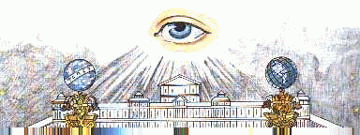 |
 |
| The Great Light in Masonry |
There are three -- the Holy Bible, the Square, and the Compasses. The Holy Bible is always referred to as "The Great Light" or "The Great Light in Masonry," in this country which is predominantly Christian. The practice may be and often is different in other lands. What is vital and unchangeable, a Landmark of the Order, is that a Volume of the Sacred Law be open upon the Masonic altar whenever the lodge is open. A lodge that is wholly Jewish may prefer to use only the old Testament; in Turkey and Persia the Koran would be used as the Volume of the Sacred Law of the Mohammedan; Brahmins would use the Vedas. In the Far East where Masonic lodges have members of many races and creeds it is customary to have several holy books upon the altar that the initiate may choose that which is to him the most sacred. The Holy Bible, our Great Light in Masonry, is opened upon our altars. Upon it lie the other Great Lights -- the Square and Compasses. Without all three no Masonic Lodge can exist, much less open or work. Together with the warrant from Grand Lodge, they are indispensable. The Bible on the altar is more than the rule and guide of our faith. It is one of the greatest of Freemasonry's symbols. For the Bible is here a symbol of all holy books of all faiths. It is the Masonic way of setting forth that simplest and most profound of truths which Masonry has made so peculiarly her own: that there is a way, that there does run a road on which men "of all creeds, and of every race" may travel happily together, be their differences of religious faith be they what they may. In his private devotions a man may petition God or Jehovah, Allah or Buddha, Mohammed or Jesus; he may call upon the God of Israel or the First Great Cause. In the Masonic Lodge he hears humble petition to the Great Architect of the Universe, finding his own deity under that name. A hundred paths may wind upwards around a mountain; at the top they meet. Freemasonry opens the Great Light upon her altar not as one book of one faith, but as all books of all faiths, the book of the Will of the Great Architect, read in what language, what form, what shape we will. It is as all-inclusive as the symbols which lie upon it. The Square is not for any one lodge, any one nation, any one religion -- it is for Masons, everywhere, to all of whom it speaks the same tongue. The Compasses circumscribe the desires of Masons wheresoever dispersed; the secret of the Square, held between the points of the Compasses is universal. Countless references in our ritual are taken from the Old Testament. Almost every name in a Masonic lodge is from the Scriptures. In the Great Light are found those simple teachings of the universality of brotherhood, the love of God for his children, the hope of immortality, which are the very warp and woof of Freemasonry. Let it be emphasized; these are the teachings of Freemasonry in every tongue, in every land, for those of every faith. Our Great Light is but a symbol of the Volume of the Sacred Law. Freemasonry is no more a Christian organization than it is Jewish or Mohammedan or Brahmin. Its use of the collection of sacred writings of the Jews (Old Testament) and the Gospels of the New Testament as the Great Light must not confuse the initiate so that he reads into Freemasonry a sectarian character which is not there. This
is so well understood that it needs emphasis only for the novice. To
give
him specific facts as well as assertion: the Bible is first mentioned
as
a Great Light in Masonry about 1760, whereas the first one of the Old
Charges
(one of the foundation stones on which rest the laws of Freemasonry,
first
published in 1723, but presumably adopted by the Mother Grand Lodge at
its formation in 1717) reads in part as follows (spelling modernized):
Perhaps
never before has so short a paragraph had so profound an effect,
setting
forth the non-sectarian, non-doctrinal character of Freemasonry, making
religion, not a religion, the important matter in the Ancient
Craft. Source:
|
© Copyright 2013-2015 Murrells Inlet Lodge 368 All Rights Reserved